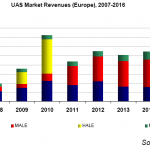Browse: Page 34
By europolice on 9. November 2011
 By Philip Willan
By Philip Willan
The Italian company criticized for supplying the brutal Syrian regime with telecommunications surveillance equipment has frozen participation in the project and is seeking a way to extricate itself from the contract, Area SpA CEO Andrea Formenti said Wednesday.
„At the moment we have no people down there and the project has made no progress in the last two months,“ Formenti told the Milan daily Corriere della Sera. „The interception system has never been activated and cannot be under current circumstances. There has been no repression carried out thanks to our equipment.“
The existence of Area’s US$18 million contract with the state-owned Syrian Telecommunications Establishment was revealed by the Bloomberg news agency a week ago. Under Project Asfador, named after a man who cold-called the company and encouraged it to bid on the deal in 2008, Syrian security agents would be able to monitor the communications and Web use of opponents to the regime of President Bashar al-Assad, which has killed more than 3,000 people since popular protests broke out in March. Continue reading „Italian VAR wants out of Syrian surveillance deal“
Posted in English, European Police, Kommunikation, Secret Service, Software/ IT
By europolice on 9. November 2011
 It wont be long before the Syrian regime, with the help of four Western companies, sets up perhaps the world’s most sophisticated online tracking and surveillance system. Its goal? To assist Syrian security forces in their door-to-door hunt for activists. These companies have been racing against the clock to complete this extensive network. Since March, 3,500 citizens have been killed, including the deliberate targeting of human rights activists. Before time runs out, we must stop these companies.
It wont be long before the Syrian regime, with the help of four Western companies, sets up perhaps the world’s most sophisticated online tracking and surveillance system. Its goal? To assist Syrian security forces in their door-to-door hunt for activists. These companies have been racing against the clock to complete this extensive network. Since March, 3,500 citizens have been killed, including the deliberate targeting of human rights activists. Before time runs out, we must stop these companies.
We’re told by insiders that their CEO’s are on high alert, including one CEO who has announced a temporary hold on activities. Sustained public pressure will force them all to permanently withdraw. Add your name to this urgent petition now, and we’ll deliver it to their boardroom doors.
The four companies involved, Area (Italian), NetApp (American), Qosmos (French) and Utimaco (German), directly or indirectly provide the technologies needed to monitor the communications of activists on the ground fighting for democracy. The technologies of all four of these companies are required to enable the surveillance system to work properly. We just need one of them to pull out and President Assad’s latest deadly plan will stumble before it properly gets off the ground. Continue reading „American, French, German, Italian firms selling Syrian regime Internet use tracking systems – sign to stop them!“
Posted in English, European Police, Software/ IT, Was tun?
By europolice on 9. November 2011
 Former undercover British police agent Mark Kennedy has cancelled his visit to Copenhagen to attend the CPH:DOX documentary film festival after protests from Danish and British climate activists.
Former undercover British police agent Mark Kennedy has cancelled his visit to Copenhagen to attend the CPH:DOX documentary film festival after protests from Danish and British climate activists.
Kennedy, 41, was due to take part in a debate after the screening of ‘Undercover Cop’, a documentary about the seven years he spent infiltrating environmental activist communities under the alias Mark Stone.
But the ex-policeman dropped the appearance after activist network, the Climate Collective, released a statement saying he was not welcome in Denmark.
“Having spent years infiltrating English climate activists, Mark Kennedy is to many a symbol of the massive repression activists have experiences the last couple of years,” the statement read. Continue reading „Activist spy cancels visit to documentary festival“
Posted in English, European Police
By europolice on 9. November 2011
 Wir laden alle zu einem transnationalen No Border Camp in Stockholm im Sommer 2012 ein: eine Woche, die von zivilem Ungehorsam, Diskussionen, Filmvorführungen und direkten Aktionen gegen die europäische Migrationspolitik geprägt sein soll.
Wir laden alle zu einem transnationalen No Border Camp in Stockholm im Sommer 2012 ein: eine Woche, die von zivilem Ungehorsam, Diskussionen, Filmvorführungen und direkten Aktionen gegen die europäische Migrationspolitik geprägt sein soll.
No Border Camps gibt es seit fünfzehn Jahren. In Grenz- und Konfliktregionen in aller Welt haben sie als autonome Zonen für eine internationale Bewegung gedient, die von der Abschaffung aller Nationalstaaten träumt. Die Camps sind Teil eines Kampfes für eine Welt, in der niemand das Recht hat, andere zu unterdrücken, etwa aufgrund ihres Geburtsortes. Sie sind ein Teil des Kampfes gegen Grenzen und gegen eine Weltordnung, in der Menschen bei ihrer Geburt in Kategorien von Nationalität, Klasse, Geschlecht, Rasse und Funktionsfähigkeit eingeteilt werden: in Kategorien von Über- und Unterordnung, Autorität und Unterwürfigkeit, Recht und Unrecht.
Die Ausschlüsse, die diesen Kategorien folgen, vollziehen sich nicht nur entlang nationalstaatlicher Grenzen, sondern prägen auch nationalstaatliche Gesellschaften: sie gehen mitten durch ihre Städte, ja sogar durch die Menschen selbst.
So sieht die Politik einer autoritären und kapitalistischen Gesellschaftsordnung aus: Continue reading „Aufruf zum No Border Camp in Stockholm 2012“
Posted in Border Control, Was tun?
By europolice on 9. November 2011
 The Vancouver Police Department maintains peace and order in British Columbia’s largest city, which has over half a million residents and is a popular venue for large events. To support their focus on intelligence-led policing, they deployed ESRI’s enterprise geographic information system (GIS) technology that provides users across their organization with better access to mission-critical data, as well as advanced mapping and analysis tools for quickly identifying crime patterns. Through the GIS, they have integrated various systems and developed specialized applications for crime prevention and reduction. In recognition of their outstanding technology application, ESRI Canada today presented the Vancouver Police Department with an Award of Excellence in GIS.
The Vancouver Police Department maintains peace and order in British Columbia’s largest city, which has over half a million residents and is a popular venue for large events. To support their focus on intelligence-led policing, they deployed ESRI’s enterprise geographic information system (GIS) technology that provides users across their organization with better access to mission-critical data, as well as advanced mapping and analysis tools for quickly identifying crime patterns. Through the GIS, they have integrated various systems and developed specialized applications for crime prevention and reduction. In recognition of their outstanding technology application, ESRI Canada today presented the Vancouver Police Department with an Award of Excellence in GIS.
“Keeping communities safe requires law enforcers to be several steps ahead of potential crime activity,” commented Alex Miller, president, ESRI Canada. “GIS helps police forces be proactive by allowing them to methodically view crime information, and apply various types of analysis to uncover trends. This enables them to accurately predict when and where crimes will likely occur. We saw this in action during the 2010 Vancouver Winter Games, where the Vancouver Police Department used GIS analysis to ensure the safety of millions of people. They’ve since developed several innovative applications that help them go beyond the call and better serve citizens.” Continue reading „Vancouver Police Focuses on Intelligence-Led Policing for Proactive Crime Reduction“
Posted in Crowd Control, English, European Police, Policing Major Events, Software/ IT
By europolice on 8. November 2011
 Die Waadtländer Polizei lässt heimlich eine Reihe von ausgeklügelten Trojanern fürs Handy entwickeln. Damit will sie Daten von Verdächtigen erhalten. Die Aktion ist umstritten.
Die Waadtländer Polizei lässt heimlich eine Reihe von ausgeklügelten Trojanern fürs Handy entwickeln. Damit will sie Daten von Verdächtigen erhalten. Die Aktion ist umstritten.
Nachdem die Waadtländer Polizei erfolgreich einem Pädophilen Spyware in den Computer gepflanzt hat, möchte sie auch in die Mobiltelefone von Verdächtigen eindringen. Im Geheimen gab sie der Fachhochschule für Ingenieurwesen und Handel des Kantons Waadt (HEIG-VD) in Yverdon einen Auftrag, schreibt «Le Matin». Deren Studenten sollen Trojaner für Smartphones entwickeln. Auf der Anforderungsliste stehen das Auspionieren von Anrufen, sowie SMS- und Standortdaten. Der Auftrag ist vertraulich. Wer dahinter steckt, will die Schule nicht offen legen.
Die Waadtländer Kantonspolizei bestätigt aber auf Anfrage eine Zusammenarbeit mit der Fachhochschule: «Wir haben Partnerschaften mit mehreren Fachhochschulen im Kanton, einschliesslich der HEIG-VD, um unseren Bedarf im Bereich Technologie zu decken und auf neue Entwicklungen zu reagieren», sagte Jean-Christophe Sauterel, Sprecher der Waadtländer Kantonspolizei. (weiter auf 20min.ch)
Posted in European Police, Forschung, Remote Forensic, Software/ IT
By europolice on 8. November 2011
Mark Kennedy, the English undercover cop who was exposed last year, is coming to Denmark during the CPH DOX documentary film festival. He is invited to speak in connection to the screening of a documentary telling his story.
The Climate Collective strongly opposes that Mark Kennedy gives a talk at the festival or for that matter that he makes any appearance in Denmark at all. Having spent years infiltrating English climate activists, Mark Kennedyis to many a symbol of the massive repression activists have experienced the last couple of years.
Using undercover cops is a huge democratic problem undermining peoples’ right to act politically. That the English police uses undercover cops to such an extent is in itself shocking, but the fact that Mark Kennedy and probably many of his colleagues have been collaborating with the Danish police clearly shows how far Danish police is willing to go in the use of undemocratic methods in order to prevent political activism. Continue reading „The Climate Collective strongly opposes Mark Kennedy coming to Denmark“
Posted in English, European Police
By europolice on 7. November 2011

Manfred Kohlen
Die Vereinigten Staaten sollen offener mit der Tatsache umgehen, dass sie selbst Cyberwaffen entwickelten und es aussprechen, wenn sie damit gegen die zunehmende Masse von Angriffen ausländischer Hacker vorgehe.
James Cartwright, vor seinem Rücktritt im August die Nummer Zwei der US-amerikanischen Militärs, hatte in einem Interview mit Reuters gefordert, mehr auf offensive Waffen im Cyberkrieg zu setzen.
Cartwright hatte in seiner Zeit als General das Bewusstsein der Militärs für Cyber-Security erhöht. Bei den in Intensität und Häufigkeit zunehmenden Netzwerk-Angriffen müsse man nun entsprechende Gegenmaßnahmen offen entwickeln, betonte Cartwright. Wenn man diese Waffen geheimhalte, habe auch kein Angreifer Angst davor. Continue reading „Ex-US-General: USA soll selbstentwickelte »Cyberwaffen« nutzen“
Posted in Militaer, Software/ IT
By europolice on 7. November 2011

A letter from Cairo to the Occupy/Decolonize movements & other solidarity movements.
After three decades of living under a dictatorship, Egyptians started a revolution demanding bread, freedom and social justice. After a nearly utopian occupation of Tahrir Square lasting eighteen days, we rid ourselves of Mubarak and began the second, harder, task of removing his apparatuses of power. Mubarak is gone, but the military regime lives on. So the revolution continues – building pressure, taking to the streets and claiming the right to control our lives and livelihoods against systems of repression that abused us for years. But now, seemingly so soon after its beginnings, the revolution is under attack. We write this letter to tell you about what we are seeing, how we mean to stand against this crackdown, and to call for your solidarity with us.
The 25th and 28th of January, the 11th of February: you saw these days, lived these days with us on television. But we have battled through the 25th of February, the 9th of March, the 9th of April, the 15th of May, the 28th of June, the 23rd of July, the 1st of August, the 9th of September, the 9th of October. Again and again the army and the police have attacked us, beaten us, arrested us, killed us. And we have resisted, we have continued; some of these days we lost, others we won, but never without cost. Continue reading „Call-Out for Solidarity with Egypt: Defend the Revolution“
Posted in English, Militaer, Was tun?
By europolice on 6. November 2011
 Sieben Jahre lang infiltrierte der englische Polizeispitzel Mark Kennedy als Aktivist ‚Mark Stone‘ die linke Szene in unter anderen England, Deutschland, Island und Dänemark, bevor 2010 seine Deckung aufflog. Nun wurde er zu dem Filmfestival Copenhagen DOX in Kopenhagen eingeladen, um am 12.November in einer Weltpremiere seinen Film „Undercover Cop“ dort vorzustellen und an einer Podiumsdiskussion teilzunehmen.
Sieben Jahre lang infiltrierte der englische Polizeispitzel Mark Kennedy als Aktivist ‚Mark Stone‘ die linke Szene in unter anderen England, Deutschland, Island und Dänemark, bevor 2010 seine Deckung aufflog. Nun wurde er zu dem Filmfestival Copenhagen DOX in Kopenhagen eingeladen, um am 12.November in einer Weltpremiere seinen Film „Undercover Cop“ dort vorzustellen und an einer Podiumsdiskussion teilzunehmen.
Die lokalen Klima-Aktivist_innen sind fassungslos, die Veranstalter_innen sind sich des explosiven Potenzials der Anwesenheit Kennedys durchaus bewusst. Continue reading „Ex-Polizeispitzel Mark Kennedy als Filmstar“
Posted in European Police
By europolice on 6. November 2011
 By NADAV SHEMER
By NADAV SHEMER
Cooperation in space, industry agreement will allow EU’s Galileo global-navigation satellite system to establish a satellite receiving station in Israel.
Cooperation between Israel and the European Union is set to expand into space, after Industry, Trade and Labor Minister Shalom Simhon and European Commission Vice President Antonio Tajani signed an agreement Monday in Tel Aviv.
The agreement paves the way for the EU’s Galileo global-navigation satellite system to establish a satellite receiving station in Israel, and it also strengthens bilateral cooperation in space-related research and development. (more on jpost.com)
Posted in English, Space
By europolice on 5. November 2011
 Director: Brian Hill | UK 2011 | 75 min
Director: Brian Hill | UK 2011 | 75 min
12/11 | 16:40 | 75 DKK | Grand Teatret | Telephone: 33151611 |
Tickets
13/11 | 10:00 | 75 DKK | Cinemateket | Telephone: 33743412
With ‚Undercover Cop‘, Brian Hill, one of Britain’s most innovative documentary filmmakers, once again covers one of those topics that are painful far into the democratic soul of the people: the use of undercover police agents. Hill has been given full access to follow Mark Kennedy, the English policeman, who after 7 years as a spy in the British – and European – activist scene was exposed at the beginning of 2011. Part of the film follows Kennedy during the tough period after his exposal, but Hill doesn’t limit himself to the this traditional approach. Instead, the director sets the agent up in front of a green screen and lets him perform his own story, thereby reconstructing the key events during his work as an undercover cop. ‚Undercover Cop‘ is a highly topical documentary, which just like ‚Better This World‘ (see Amnesty Award) questions how far the state can go in its use of lies and deceit without losing the basic faith of its citizens. Continue reading „Undercover Cop“
Posted in English, European Police
By europolice on 5. November 2011

By Jared Keller
In a nondescript building in Virginia, „vengeful librarians“ are tracking millions of tweets, blog posts, and Facebook updates from around the world
How stable is China? What are people discussing and thinking in Pakistan? To answer these sorts of question, the U.S. government has turned to a rich source: social media.
The Associated Press reports that the CIA maintains a social-media tracking center operated out of an nondescript building in a Virginia industrial park. The intelligence analysts at the agency’s Open Source Center, who other agents refer to as „vengeful librarians,“ are tasked with sifting through millions of tweets, Facebook messages, online chat logs, and other public data on the World Wide Web to glean insights into the collective moods of regions or groups abroad. According to the Associated Press, these librarians are tracking up to five million tweets a day from places like China, Pakistan and Egypt: Continue reading „How The CIA Uses Social Media to Track How People Feel“
Posted in English, European Police, Kommunikation, Secret Service, Software/ IT
By europolice on 4. November 2011
 By Ben Elgin and Vernon Silver
By Ben Elgin and Vernon Silver
As Syria’s crackdown on protests has claimed more than 3,000 lives since March, Italian technicians in telecom offices from Damascus to Aleppo have been busy equipping President Bashar al-Assad’s regime with the power to intercept, scan and catalog virtually every e-mail that flows through the country.
Employees of Area SpA, a surveillance company based outside Milan, are installing the system under the direction of Syrian intelligence agents, who’ve pushed the Italians to finish, saying they urgently need to track people, a person familiar with the project says. The Area employees have flown into Damascus in shifts this year as the violence has escalated, says the person, who has worked on the system for Area.
Area is using equipment from American and European companies, according to blueprints and other documents obtained by Bloomberg News and the person familiar with the job. (more on businessweek.com)
Posted in English, European Police, Kommunikation, Remote Forensic, Secret Service, Software/ IT
By europolice on 4. November 2011
 by Pratap Chatterjee
by Pratap Chatterjee
Technology from an American company is being used by the Syrian government to censor the Internet and monitor dissidents, according to activists.
The equipment produced by a major SiliconValley company, Blue Coat, allows corporations and governments to manage data traffic. But it can also be used to monitor users and block access to certain websites, such as social networking applications like Facebook and internet phone sites like Skype, which were key to the Arab Spring uprisings in Egypt and Tunisia.
Activists are now concerned that the Syrian government ruled by the al-Assad family is using the Blue Coat technology to help suppress protesters.
In August Telecomix, a group founded by Swedish ‘hacktivists’, which has provided technical support to dissidents in the Middle East on encryption and creating local communication systems, downloaded 54 gigabytes of Syrian telecommunications data.
According to the activists the data showed that technology from Blue Coat- a SG-400 and a BlueCoat Proxy SG-9000 – were used to filter Internet communications in the country. Continue reading „SYRIA: US technology used to censor the Internet in Syria“
Posted in English, European Police, Kommunikation, Remote Forensic, Secret Service, Software/ IT
By europolice on 4. November 2011
Die Londoner Metropolitan Polizei soll ein neues System zur Überwachung von Mobiltelefonen angeschafft haben. Laut einem Bericht des Guardian kann sich das System als Mobilfunknetz tarnen, Handys aus der Entfernung abschalten, in die Kommunikation eingreifen und Daten über Tausende Nutzer in einem vorgegebenen Zielgebiet erheben.
Die Reichweite des Überwachungssystems soll rund zehn Quadratkilometer betragen. Innerhalb dieses Radius können Signale ausgesendet werden, um von Hunderten Mobiltelefonen die eindeutige International Mobile Subscriber Identity (IMSI) und International Mobile Equipment Identity (IMEI) abzufragen. Damit können die Bewegungen der betroffenen Handybesitzer in Echtzeit mitverfolgt werden. (weiter auf unwatched.org)
Posted in Crowd Control, European Police, Kommunikation
By europolice on 3. November 2011
 Es klingt bedrohlich: Die Europäische Union und die USA spielen in einem gemeinsamen Manöver den Cyberwar-Ernstfall durch. Ein zielgerichteter Schnüffel-Angriff und eine Attacke auf das Stromnetz werden simuliert. Doch in Wahrheit geht es vor allem ums gegenseitige Kennenlernen.
Es klingt bedrohlich: Die Europäische Union und die USA spielen in einem gemeinsamen Manöver den Cyberwar-Ernstfall durch. Ein zielgerichteter Schnüffel-Angriff und eine Attacke auf das Stromnetz werden simuliert. Doch in Wahrheit geht es vor allem ums gegenseitige Kennenlernen.
Brüssel – Stell dir vor, es ist Cyber-Bündnisfall, und keiner weiß, wohin: Wer kennt den Status der kritischen Infrastruktur? Welche Verantwortlichen müssen in welchen Ländern in welcher Reihenfolge über einen Cyber-Notfall informiert werden – und wie war doch gleich die Telefonnummer des jetzt so dringend benötigten Kollegen aus Übersee?
Die Vorstellung mag absurd klingen, aber tatsächlich sind weder Europa noch die Vereinigten Staaten wirklich auf einen Cyber-Notfall vorbereitet. Wenn hier wie drüben die Datennetze großflächig zusammenbrechen und die davon abhängigen kritischen Infrastrukturen ausfallen, könnte wochen-, vielleicht sogar monatelang das Internet-Licht ausbleiben.
Dieser Zustand muss sich ändern, haben die Europäische Union und die Vereinigten Staaten deshalb auf dem letztjährigen EU/US-Gipfel in Lissabon beschlossen – und sich für heute, den 3. November 2011, zum gemeinsamen Cyber-Manöver Cyber Atlantic 2011 verabredet. (weiter auf spiegel.de)
Posted in European Police, Software/ IT
By europolice on 3. November 2011
 Tasked with patrolling millions of square miles of water over vast ocean distances, the U.S. Coast Guard is looking to augment its surveillance forces with unmanned air vehicles (UAVs). These craft would serve to alert cutters to what lies over the distant ocean horizon.
Tasked with patrolling millions of square miles of water over vast ocean distances, the U.S. Coast Guard is looking to augment its surveillance forces with unmanned air vehicles (UAVs). These craft would serve to alert cutters to what lies over the distant ocean horizon.
Rear Adm. Charles W. Ray, USCG, the commander of the 14th Coast Guard District, told the final breakfast audience at TechNet Asia-Pacific 2011 how the vast area of responsibility across the Pacific Ocean tasks Coast Guard operations. Many isolated islands and atolls are U.S. territory, and their fish-rich waters constitute more than a million square miles of U.S. exclusive economic zones. The Coast Guard needs a persistent presence in these waters, and UAVs can help fill that need, the admiral said. Continue reading „The Coast Guard Wants UAVs“
Posted in Drohnen, English
By europolice on 3. November 2011
 Ob auf Verbrecherjagd oder bei Rettungseinsätzen: Ein unbemanntes Fluggerät unterstützt fortan die texanischen Polizei bei ihrer Arbeit – mit Infrarotkamera und auf Wunsch bewaffnet.
Ob auf Verbrecherjagd oder bei Rettungseinsätzen: Ein unbemanntes Fluggerät unterstützt fortan die texanischen Polizei bei ihrer Arbeit – mit Infrarotkamera und auf Wunsch bewaffnet.
Auf den ersten Blick ähnelt die neuste Entwicklung der US-Drohnenschmiede Vanguard Defense Industries einem Modellhelikopter im Sheriff-Look. Doch der ShadowHawk MK-II ist bei Weitem kein Spielzeug: Die Drohne ist mit einer Infrarotkamera ausgerüstet, kann mit Waffen aufgerüstet werden und soll künftig in Polizei- und Rettungseinsätzen dienen. An einen Laptop angeschlossen, lässt sich das unbemannte Flugsystem mit einem Gamecontroller-ähnlichen Bedienelement steuern. Continue reading „Die Drohne, dein Freund und Helfer“
Posted in Drohnen, European Police
By europolice on 3. November 2011
 MITTEILUNG DER KOMMISSION AN DAS EUROPÄISCHE PARLAMENT UND DEN RAT
MITTEILUNG DER KOMMISSION AN DAS EUROPÄISCHE PARLAMENT UND DEN RAT
Die Reisefreiheit der EU-Bürger und die Abschaffung der Kontrollen an den Binnengrenzen des Schengen-Raums zählen zu den am stärksten spürbaren Errungenschaften der Europäischen Union. Die Kommission hat unlängst Vorschläge zur allgemeinen Stärkung der Verwaltung des Schengen-Raums vorgelegt, durch die sichergestellt werden soll, dass diese große Errungenschaft weiter verbessert und in einem wirklich gemeinsamen europäischen Rahmen weiterentwickelt wird.
Die Unversehrtheit der EU-Außengrenzen ist eine unabdingbare Voraussetzung für den Schengen-Raum in seiner heutigen Form und wird dies auch weiterhin bleiben. Maßnahmen zur Verwaltung der Außengrenzen müssen stets das doppelte Ziel verfolgen, sowohl die Sicherheit zu verbessern als auch das Reisen zu erleichtern. Die Möglichkeiten, die neue Technologien in dieser Hinsicht bieten, waren bereits Thema der im Jahr 2008 vorgelegten Mitteilung der Kommission „Vorbereitung der nächsten Schritte für die Grenzverwaltung in der Europäischen Union“ , in der mögliche Aspekte der heute als „Initiative für intelligente Grenzen“ bekannten Maßnahme vorgestellt und das Europäische Parlament und der Rat um Stellungnahmen ersucht wurden. (Download von ec.europa.eu)
Posted in Border Control |
















